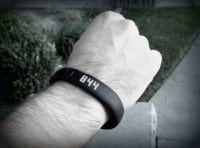Track me once, track me twice

New wearable tech is making (some of) us happier and healthier people
- Dateline
- 2 September 2015
Google Glass started it all, and now the viral spread of the Quantified Self meme is showing us the good, the bad and the ugly on the screens of our high tech bracelets and necklaces. With the demand for wearable technology far outstripping supply, there’s no denying it; no one likes average – everyone wants to be awesome. And how do you become an A-list version of yourself? You self-improve… or you try to, at least.
Self-help books are rotting away on the shelf, because wearable tech is radically changing the game of self-improvement. People can now see and hear the cold, hard evidence; how often they put their hands in the cookie jar, how regularly they use sarcastic tones and how many hours they spend binge-watching on Netflix.
Renowned sociologist, Leo Wu, is not surprised that life loggers are wanting to address their ‘weaknesses’. “Sometimes you only fully see your own reality when you can observe it as a spectator from the outside, and this is exactly what life logging allows people to do,” Wu told TIME magazine.
In affluent areas, where the gospel of self-tracking has taken off, we already see a gradual decline in the sale of sugary treats and junk food. The Twittersphere has been abuzz with complaints of over-full yoga classes. And by the way, if you’re looking to see a sleep expert, the waiting lists are a drag.
However, the striving for perfection that accompanies the ‘life-as-an-optimizable-project’ phenomenon is leaving some people worse off than before. The biggest psychiatric clinic in the world, Harrison Memorial Hospital, has already had to admit many individuals whose life logging has led to anorexia, Narcissism and obsessive compulsive disorder.
It seems like Socrates had it wrong: It’s not the unexamined life that’s not worth living, it’s the over-examined one.
ANALYSIS >> SYNTHESIS: How this scenario came to be
Links to related stories
- Lifelogging: The Most Miserable, Self-Aware 30 Days I've Ever Spent - Mashable, 20 March 2014
- How Wearable Tech Goes From Geek Fad To Mega-trend - The Washington Post, 11 March 2014
- How Lifelogging Is Transforming The Way We Remember And Track Our Lives - Wired, 6 October 2013
- The Quantified Self: Counting Every Moment - The Economist, 3 March 2012
- MindBullet: WE'RE ALL SLAVES TO BIG DATA (Dateline: 22 April 2016, Published: 11 April 2013)
Warning: Hazardous thinking at work
Despite appearances to the contrary, Futureworld cannot and does not predict the future. Our Mindbullets scenarios are fictitious and designed purely to explore possible futures, challenge and stimulate strategic thinking. Use these at your own risk. Any reference to actual people, entities or events is entirely allegorical. Copyright Futureworld International Limited. Reproduction or distribution permitted only with recognition of Copyright and the inclusion of this disclaimer.